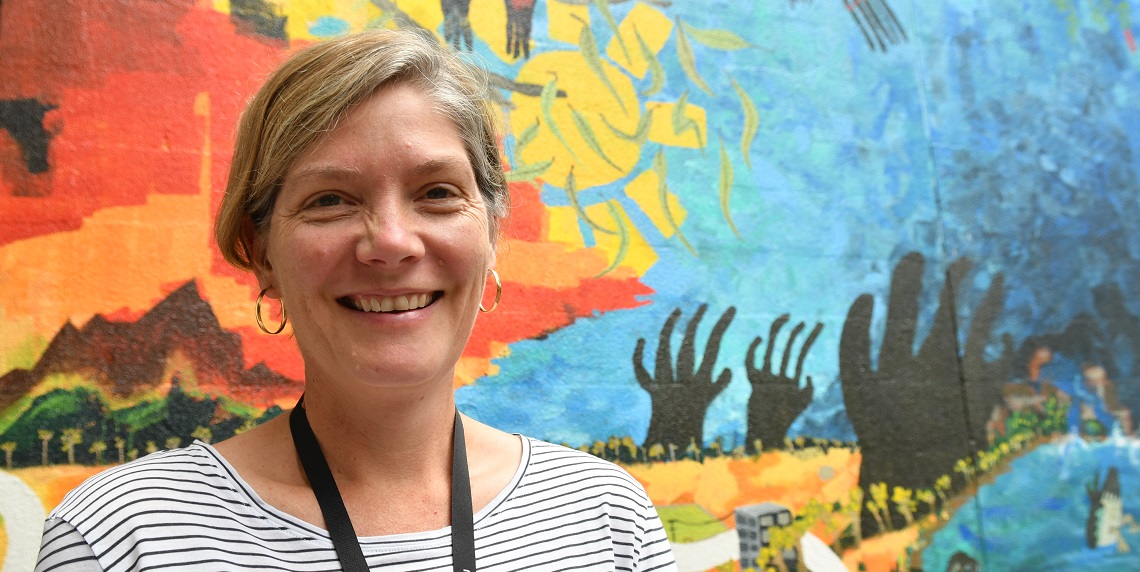
We spend a moment to chat with Dr Liz Lynch, a new Matthew Flinders Fellow who has joined the Caring Futures Institute to help further this dynamic research group’s studies into more effective interactions between patients and health professionals.
What does your work focus on?
My research looks at ways to improve how rehabilitation is delivered to people with stroke. I’m working with health professionals, stroke survivors, their families and friends to find out how best to structure stroke rehab programs, so that people receive care in a way that best suits them best while also giving them the best chance of a positive recovery.
We have amazing clinical guidelines that address stroke that are “living” documents, which means they get updated every three months to ensure they do not go out of date. Any new research gets incorporated into these guidelines, which health professionals can then use to guide their clinical practice.
There is a gap, though. Many people with stroke don’t receive the care that is recommended in the guidelines, so I’m working on projects to investigate ways that will address this gap between guidelines and practice.
I’m currently leading a project that involves people with stroke, their carers and health professionals, and we’re working together to find better ways of providing information after stroke. That’s a really stressful time for everyone concerned, because stroke often comes out of the blue. Someone can be fit and well, and then they have a stroke which can leave them with all sorts of difficulties. Therefore, we are working to find ways that provide the right information in the right format, at the right time and with the right level of detail for each individual carer and stroke survivor.
Another project I recently completed has prioritised which of more 200 guideline recommendations should be the priorities to implement better stroke outcomes in Australia. Now, I’m working with the Stroke Foundation and other researchers and clinicians to develop national strategies that will improve delivery of the Top 3 recommendations we prioritised.
What journey has led you to this point in your career?
After studying physiotherapy at UniSA, I worked at the Royal Adelaide Hospital and its rehabilitation campus at Hampstead Rehabilitation Centre. I didn’t love working in the acute hospital, but really enjoyed working in rehabilitation, where I felt I could get to know my patients and their families. I was able to help people regain function and quality of life after pretty devastating injuries (spinal rehab) or strokes (stroke rehab).
While working in the senior physio stroke rehab role at Hampstead Rehab Centre from 2004 to 2012, I was always keen to implement evidence into practice, and I organised some changes to service delivery that increased the amount of scheduled practice. These are still in place 10 years later, which I think is pretty cool.
I studied Honours part-time at UniSA in 2005-6 while working full time, then enrolled in PhD at UniSA in 2012 when my oldest child started school. My PhD looked at how the rehab needs of people with stroke were assessed and managed, comparing two strategies to improve processes at 10 hospitals in SA and NSW.
Since completing my PhD in 2015, I’ve worked at all three SA universities, most recently at University of Adelaide, where I worked from mid-2016 until two weeks ago.
Can you describe a challenge in your life and how you dealt with it?
Hmmm, probably renovating our house – my husband is an engineer and son of a farmer, so he knows how to do all sorts of building work and took on the renovation of our house by himself. Our three-month renovation took three years. It’s still not all finished but what is done looks great. It certainly wasn’t an easy process. While the house was being renovated, my husband, I and our two kids all shared one bedroom for those three years.
What is something you are most proud of?
Probably my kids – which may sound corny, but it’s true. Actually, on reflection, it’s probably the fact that the whole family has managed to survive our home renovation.
What does a normal day look like for you?
It’s hectic from the outset. Take the dog out for either a walk or a run, get home, wake the kids up, morning routine, drive to work, and then the working day can vary greatly. Some days are full of meetings (lots of them virtually), but on other days I meet with stroke survivors, carers, health professionals. Other days get swallowed up with admin tasks – writing up notes from meetings, planning the next steps, talking to my co-researchers, organising presentations. So then there’s the usual amount of desk work, phone or video conferencing, and sometimes I get out in the real world, to visit hospitals, rehab centres or community. And whenever I get some spare time to relax, I like reading, walking, catching up with friends and eating nice food – especially chocolate.

